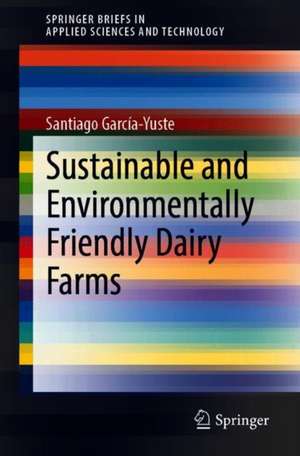Sustainable and Environmentally Friendly Dairy Farms: SpringerBriefs in Applied Sciences and Technology
Autor Santiago García-Yusteen Limba Engleză Paperback – 21 mai 2020
Sustainable and Environmentally Friendly Dairy Farms presents an innovative environmental proposal. While chiefly focusing on dairy farms, the environmental solution it describes is applicable to the entire livestock sector.
The book is divided into five chapters, the first of which addresses the carbon footprint of dairy farms. Chapter two provides an overview of the animal production system, focusing on the physiology of the ruminant stomach and the greenhouse gases emitted by dairy cows. In turn, the third chapter covers dairy farm systems, explaining both intensive and extensive husbandry systems. The book’s final two chapters present the-state-of-art in CO2 capture, and describe a new and innovative CO2-RFP strategy.
Given its scope, the book will be of interest to chemists, biologists, biotechnologists, and researchers active in agriculture and food-related areas, as well as those working in the food and dairy industry.
Din seria SpringerBriefs in Applied Sciences and Technology
-
 Preț: 380.29 lei
Preț: 380.29 lei - 17%
 Preț: 360.34 lei
Preț: 360.34 lei - 20%
 Preț: 386.12 lei
Preț: 386.12 lei -
 Preț: 380.07 lei
Preț: 380.07 lei -
 Preț: 377.95 lei
Preț: 377.95 lei -
 Preț: 382.32 lei
Preț: 382.32 lei -
 Preț: 376.59 lei
Preț: 376.59 lei -
 Preț: 379.09 lei
Preț: 379.09 lei -
 Preț: 378.12 lei
Preț: 378.12 lei - 20%
 Preț: 293.83 lei
Preț: 293.83 lei -
 Preț: 344.90 lei
Preț: 344.90 lei -
 Preț: 321.36 lei
Preț: 321.36 lei -
 Preț: 264.79 lei
Preț: 264.79 lei -
 Preț: 344.90 lei
Preț: 344.90 lei -
 Preț: 356.46 lei
Preț: 356.46 lei -
 Preț: 382.95 lei
Preț: 382.95 lei -
 Preț: 355.66 lei
Preț: 355.66 lei -
 Preț: 479.67 lei
Preț: 479.67 lei -
 Preț: 415.18 lei
Preț: 415.18 lei -
 Preț: 444.52 lei
Preț: 444.52 lei - 20%
 Preț: 301.86 lei
Preț: 301.86 lei -
 Preț: 409.43 lei
Preț: 409.43 lei - 20%
 Preț: 322.17 lei
Preț: 322.17 lei -
 Preț: 355.49 lei
Preț: 355.49 lei - 15%
 Preț: 462.51 lei
Preț: 462.51 lei -
 Preț: 377.18 lei
Preț: 377.18 lei -
 Preț: 355.93 lei
Preț: 355.93 lei -
 Preț: 382.95 lei
Preț: 382.95 lei -
 Preț: 378.12 lei
Preț: 378.12 lei -
 Preț: 378.12 lei
Preț: 378.12 lei -
 Preț: 380.07 lei
Preț: 380.07 lei -
 Preț: 380.07 lei
Preț: 380.07 lei - 20%
 Preț: 326.28 lei
Preț: 326.28 lei -
 Preț: 312.68 lei
Preț: 312.68 lei -
 Preț: 356.43 lei
Preț: 356.43 lei -
 Preț: 412.30 lei
Preț: 412.30 lei - 20%
 Preț: 225.31 lei
Preț: 225.31 lei -
 Preț: 378.12 lei
Preț: 378.12 lei -
 Preț: 376.59 lei
Preț: 376.59 lei -
 Preț: 195.87 lei
Preț: 195.87 lei -
 Preț: 376.22 lei
Preț: 376.22 lei - 20%
 Preț: 324.64 lei
Preț: 324.64 lei - 20%
 Preț: 288.73 lei
Preț: 288.73 lei -
 Preț: 377.57 lei
Preț: 377.57 lei -
 Preț: 261.91 lei
Preț: 261.91 lei -
 Preț: 381.98 lei
Preț: 381.98 lei -
 Preț: 273.64 lei
Preț: 273.64 lei -
 Preț: 410.87 lei
Preț: 410.87 lei -
 Preț: 379.68 lei
Preț: 379.68 lei -
 Preț: 374.30 lei
Preț: 374.30 lei
Preț: 444.74 lei
Nou
Puncte Express: 667
Preț estimativ în valută:
85.11€ • 92.42$ • 71.49£
85.11€ • 92.42$ • 71.49£
Carte tipărită la comandă
Livrare economică 22 aprilie-06 mai
Preluare comenzi: 021 569.72.76
Specificații
ISBN-13: 9783030460594
ISBN-10: 3030460592
Pagini: 112
Ilustrații: IX, 112 p. 45 illus., 38 illus. in color.
Dimensiuni: 155 x 235 x 10 mm
Greutate: 0.19 kg
Ediția:1st ed. 2020
Editura: Springer International Publishing
Colecția Springer
Seria SpringerBriefs in Applied Sciences and Technology
Locul publicării:Cham, Switzerland
ISBN-10: 3030460592
Pagini: 112
Ilustrații: IX, 112 p. 45 illus., 38 illus. in color.
Dimensiuni: 155 x 235 x 10 mm
Greutate: 0.19 kg
Ediția:1st ed. 2020
Editura: Springer International Publishing
Colecția Springer
Seria SpringerBriefs in Applied Sciences and Technology
Locul publicării:Cham, Switzerland
Cuprins
Greenhouse Gases and Carbon Footprint.- Animal Production.- Husbandry: Milk production.- The State-of-the-Art of CO2 Capture.- CO2-Rumen Fermentation Process Strategy
Notă biografică
Santiago García-Yuste received his B.A. from the University of Alcala (UAH) in Spain, in 1990 and his Ph.D. in Inorganic Chemistry from the University of Castilla-La Mancha (UCLM) in Spain, in 1995 under the guidance of Professors A. Otero and A. Antiñolo, where he began pursuing research in Organometallic Chemistry. He completed his postdoctoral studies with Professor Lutz H. Gade at the University of Wuerzburg (Germany) in 1997. He then returned to the UCLM, where he is now a Lecturer in Inorganic Chemistry at the Faculty of Chemical Sciences and Technologies. His research interests are chiefly in hydride niobocene organometallic chemistry research including “non-classical” di-hydrogen complexes and ROP polymerization processes. Since 2012 he has increasingly focused on carbon dioxide utilization (CDU)-based environmental strategies for minor CO2 sources (CO2-AFP strategy and CO2-RFP strategy).
Textul de pe ultima copertă
Sustainable and Environmentally Friendly Dairy Farms presents an innovative environmental proposal. While chiefly focusing on dairy farms, the environmental solution it describes is applicable to the entire livestock sector.
The book is divided into five chapters, the first of which addresses the carbon footprint of dairy farms. Chapter two provides an overview of the animal production system, focusing on the physiology of the ruminant stomach and the greenhouse gases emitted by dairy cows. In turn, the third chapter covers dairy farm systems, explaining both intensive and extensive husbandry systems. The book’s final two chapters present the-state-of-art in CO2 capture, and describe a new and innovative CO2-RFP strategy.
Given its scope, the book will be of interest to chemists, biologists, biotechnologists, and researchers active in agriculture and food-related areas, as well as those working in the food and dairy industry.
Caracteristici
Presents a new, environmentally friendly approach to animal husbandry Demonstrates how carbon dioxide utilization methods can be used to reduce greenhouse-gas emissions from dairy farms Illustrates the benefits of these methods at both the local and global scale
